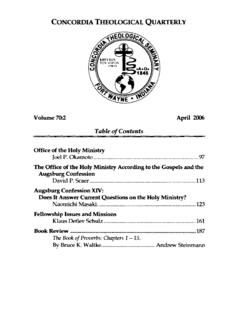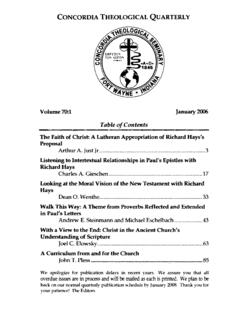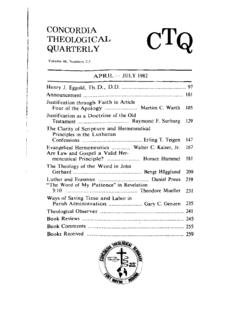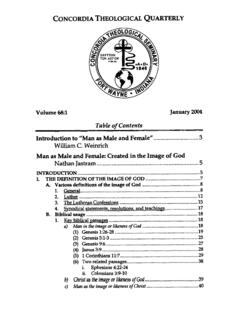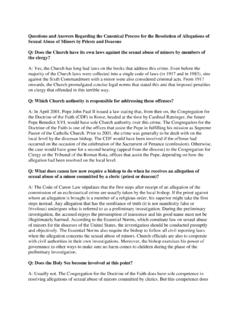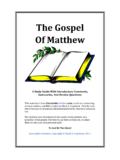Transcription of Jesus and the Gnostic Gospels - CTSFW
1 Volume 7l:2 April 2007. Table of Contents - - Talking about the Son of God: An Introduction .. 98. Recent Archaeology of Galilee and the Interpretation of Texts from the Galilean Ministry of Jesus Mark T. Schuler .. 99. Response by Daniel E. Paavola .. 117. Jesus and the Gnostic Gospels Jeffrey Kloha ..,..121. Response by Charles R. Schulz ..144. Ref ormation Christology:Some Luther Starting Points Robert 147. Response by Naornichi Masaki .. 168. American Christianity and Its Jesuses Lawrence R. Rast 175. Response by Rod Rosenbladt ..194. Theological Observer The Lost Tomb of Jesus ? .. 199. CTQ 71 (2007):121-144. Jesus and the Gnostic Gospels Jeffrey Kloha I. Why Are We Talking about the Gnostic Gospels ?'.
2 If we were to discuss Christology, and specifically the relationship between the Christology of the ' Gnostic ' Gospels and the Christology of the canonical Gospels , this would be a short paper because there is no Christology in the Gnostic Gospels . More precisely, we could consider the Christology of Seth because the gospel of Judas calls Seth-not Jesus - the "Christ." That, however, is not the challenge, but the fact that the questions raised by the Gnostic Gospels go to the very heart of the Christian faith: Who is Jesus ? What did he do? What is the human condition and humanity's place in the world? What is our relationship to the divine? What is the nature of salvation? Indeed, what is Christianity? The issue is what was done with and to Jesus in the second century.
3 The problem facing the church is how to account for these "newly discovered" or previously "lost" texts. They were written by people in the second century who claimed to be followers of Jesus yet present an entirely different perspective of him. Beyond those questions, a further requirement is to help students, pastors, teachers, and the people in our pews deal with the challenges that these texts present to creedal Christianity. The problem is acute, since they have heard and have read that these texts give us a "better" Jesus than the one that we proclaim. Previous generations fought over the Bible. For better or for worse, the battle used to be over creationism, Jonah, the Mosaic authorship of the Pentateuch, and how many Isaiahs there might be.
4 Above all, however, the battle was fought over the first century and Jesus . Historical criticism attacked the text and replaced its authority with reconstructed sources, but historical criticism has now run its course. To be sure, there is still a Jesus Seminar, but "the Quest for the Historical Jesus " did not bring an end to historic, creedal Christianity. The Jesus of history could not be pried away from the church, and so the church is now the target. The battleground has changed. The nature of Christianity in the second century, rather than the first century, is debated. What was Christianity 1 Quotations of Gnostic texts are from James M. Robinson, ed., The Nag Hanlrnadi Library in English, 3rd ed. (San Francisco: Harper & Row, 1988).
5 J e f i e y Kloha is Associate Professor of Exegetical Theology at Concordia Seminary, St. Louis, Missouri. like after Jesus ? Or, as it is more often stated, what were "Christianities". like? It is no longer assumed that the same Christian faith was preached everywhere by all. Rather, some took Jesus and ran one way, some another. Some died out early, like the Nazoreans. Others died out later, like the so-called Gnostics. The Nazoreans may have simply been too indistinct from Judaism and too small to be sustainable. The Gnostics, it is argued, were viciously attacked by what later were called "orthodox" or "catholic Christians" and were persecuted out of existence. Is orthodox Christianity merely one possible outcome of the teachings of Jesus ?
6 Bart Ehrman's way of framing the issue is typical: "What if it had been otherwise? What if some other form of Christianity had become dominant, instead of the one that did?"2 He continues, In anticipation of these discussions, I can point out that if some other form of Christianity had won the early struggles for dominance, the familiar doctrines of Christianity might never have become the "standard" belief of millions of people, including the belief that there is only one God, that he is the creator, that Christ his son is both human and divine. The doctrine of the Trinity might never have developed. The creeds still spoken in churches today might never have been devised. The New Testament as a collection of sacred books might never have come into being.
7 Or it might have come into being with a completely different set of books .."3. Now that these "lost" or "hidden" or "secret" Gospels have been made known to our conspiracy-loving culture, we can no longer appeal simply to "the Bible" or "the Divine Inspiration of the Bible." After all, how does one externally prove that the Bible is inspired and inerrant when other books make identical claims to divine origin and authority?4 The canonical books, whether sixty-six or seventy-three or eighty-one (depending on the division of Christianity),are no longer the only game in town. 2 Bart D. Ehrman, Lost Chn'stianities: The Battle for Scripture and tlw Faiths W e Never Knew (New York: Oxford University Press, 2003), 5.
8 This book is marketed as a textbook for undergraduate classes in religion. 3 Ehrman, Lost Christianities, 6. 4 I recently presented a weekend seminar on the Gnostic Gospels for University of Iowa students at St. Paul's Lutheran Chapel. During one of the breaks, a couple of students pulled me aside to discuss the question of how we know that we have the right Bible. One student had recently been challenged by a non-Christian and was forced to acknowledge that he had no idea how we got the Bible, how we know that it is the right one, or where to begm the discussion. Kloha: Tesus and the Gnostic Gospels 123. The purpose of this paper is to begin to formulate a response to the rise of the use of Gnostic texts in the life of the church.
9 One unacceptable response is to pretend that there is not a problem. If the circus that accompanied the gospel of Judas and The Da Vinci Code proved anything, it is that people will hear about this. It would be better if our pastors and people heard about it first from us. Another unhelpful response is simply to label all the Gnostic material non-Christian and be done with it. This does not work for the thinking layperson. I have had the opportunity to offer numerous seminars on the Gnostic materials to groups of lay people and pastors. The reactions are always interesting. The pastors typically think it is all just weird, but it never fails that during one of the breaks someone comes up to me and wants to talk further about the role of women, the historicity of Jesus , or the development of the creeds.
10 Something they have read or seen on television about these materials made more sense to them than the pat answers they typically receive from us. We can decry the American suspicion of authority and institutions, love of conspiracy theory, passion about gender issues, and general rejection of the Christian world view, but this is our context. Not to give answers only leads people to question the message we preach. In this paper, I will not propose solutions, but will lay out the issues surrounding these Gnostic writings, discuss how they are analyzed, and suggest areas where we need to be engaged in the 11. Re-imagining Christianity The definition of "ancient" and "early" has changed. It sounds impressive to talk about a "historic liturgy of the ancient church," but there is little, if any, firm textual evidence for it until the fifth, or maybe the fourth, century.
